The cadences of a people’s victory

The thunderous sounds in the streets were no longer of sound grenades and bullets. They were the reverberating cheers of thousands of people celebrating the culmination of an arduous, painful and, sadly, bloody journey to victory. It is, no doubt, a victory of the students and the people of Bangladesh. And it is the total defeat of a leader and government that has shown their most monstrous side by turning state machinery, along with their party goons, on their own people.
This victory has come at the cost of hundreds of lives of overwhelmingly young people, mostly students. Even small children have not been spared—basically the future of this nation. Was it possible for a government to continue to stay in power after killing the country's future, for murdering ordinary citizens in cold blood? Was it possible for a leader to keep on denying the truth about these murders by her own direction, blaming them on her political opponents when the evidence is out in the open for all to see? Could any leader and cabinet be more detached from the pulse of the people, from the hearts of the youth?
The outcome of the events of the last few weeks were inevitable. Even after killing more than 200 people in less than a week and with no let up from the protesters, Sheikh Hasina's obstinance prevailed. On August 4, the violence escalated to newer levels, leaving at least 93 dead. The former prime minister had become deaf to the cries of the people, blind to the sea of blood she had spilled with the help of the police, BGB, and the unnamed goons who fired guns right beside these forces. Thus, on August 5, despite an indefinite curfew being called, in spite of the memory of those chilling sounds of impending death, the people could not be held back. In Dhaka, the eerie calmness of the morning changed very quickly with crowds forming practically on every main thoroughfare, with the biggest one in Shahbag, where everyone seemed to congregate. As hard as it is to believe, only a little while ago, protesters had been shot near the Shaheed Minar and other areas.
When the army started to clear the way for the crowd, the mood changed even more dramatically. Even before the news of the unseemly exit of the former prime minister from Gono Bhaban by helicopter started spreading, the sounds of freedom from a repressive regime that had shown just how merciless it could get to retain power, resonated throughout the streets. The incredibly brave young people of this country have steadfastly stood up once again against the full force of an autocratic government—and won!
But volatility is a constant in our reality; all too soon, things did take an ugly turn. The pent-up anger of people was displayed in the most distasteful way with the ransacking of Gono Bhaban, seen as the seat of a hated regime, setting of fire to the Bangabandhu Bhaban at Dhanmondi 32 and to police stations all over the country, and attacks on houses and businesses belonging to the Hindu community and on their temples. The feeling of jubilation was tainted by the violence which went on without any hindrance. After watching children, students and ordinary citizens being ruthlessly murdered by the orders of the government, the fury of the public is understandable. But violence cannot bring justice for violence.
This is the message that the members of the Bangladesh Student Uprising Central Committee have voiced during their press briefing on Channel 24. They have categorically told their fellow protesters to be vigilant of those taking advantage of the situation, who have carried out arson attacks and vandalism in order to malign the movement. They asked everyone to be mindful of instigators and refrain from any kind of looting, arson, communal violence and protect all minority communities and public assets. They have insisted that their movement is peaceful and has brought about a national unity that transcends political party or religion. They promised to stand against any kind of communal violence.
The clarity and determination of these young leaders is awe-inspiring. More so because we have not heard our leaders talk like this for decades. Yes, we have claimed to be a democracy for the last 33 years. Yet, when was the last time we heard words like "justice" and "equality" from the mouth of a leader? When was the last time we heard that all cases of enforced disappearances and extrajudicial killings would be tried and those involved would be brought to book?
As of this writing, a group of representatives of the movement were set to visit Bangabhaban to meet up with the president. They have made it very clear that any government that comes without the endorsement of the members of the movement would not be acceptable and would result in the continuation of the movement.
There are, of course, misgivings that the former regime will somehow manipulate the situation, that other players including extremist forces will take over. We don't know what lies ahead for us, and the uncertainty makes us jittery and holds us back from unreservedly celebrating this victory.
But listening to the resolute voices of these young people who have a clear idea of what kind of country they want to build, one that enshrines the true values of democracy, one cannot help but feel hopeful that a real change, one that will truly free us from the suffocating clutch of fear, could actually be possible. When I see young protesters managing traffic and pictures of Muslims guarding Hindu temples on social media, the feeling gets stronger. Abu Sayed and his fellow martyrs would be proud.
Aasha Mehreen Amin is joint editor at The Daily Star.
Views expressed in this article are the author's own.
Follow The Daily Star Opinion on Facebook for the latest opinions, commentaries and analyses by experts and professionals. To contribute your article or letter to The Daily Star Opinion, see our guidelines for submission.

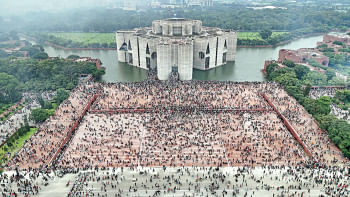
 For all latest news, follow The Daily Star's Google News channel.
For all latest news, follow The Daily Star's Google News channel. 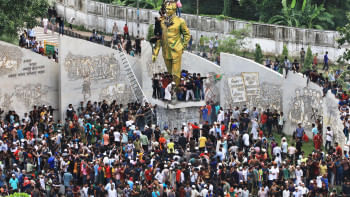
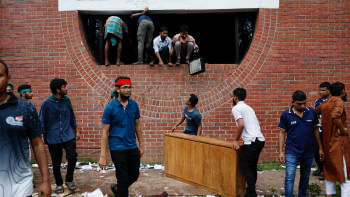
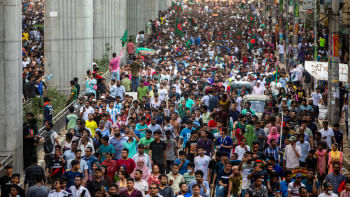








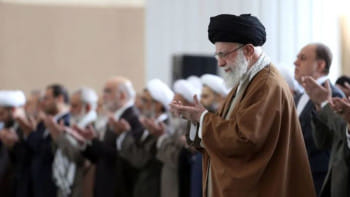
Comments